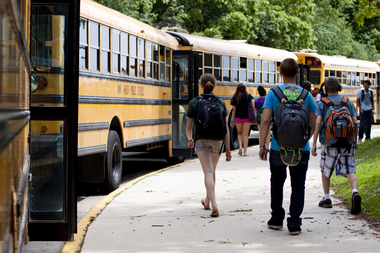Jen English has been working in Ann Arbor since she was 16.
"I really wanted to have more independence," she said. "I wanted to make my own money and do things with my friends on my own."
Now a senior at Hartland High School and working almost 20 hours per week, English strongly encourages other high school students to seek employment.

A new U-M study shows many students benefit from holding a steady job through their high school years.
AnnArbor.com file photo
"It’s a great way to expose yourself to new people, a new environment, and to become more independent," she said. "It’s a great way to transition from being a teenager to being a young adult."
But despite the positive influence employment can have on students, parents still might need to be careful about how many hours they allow their high school-aged kids work. According to University of Michigan researcher Jerry Bachman, their academic success might depend on it.
Bachman's research, which compiles two decades worth of statistical data from about 600,000 high school students, shows that students who work long hours tend to be less successful than those who work fewer hours.
"They are likely to have lower grades than those who aren’t working long hours," he said. "They‘re also more likely to smoke cigarettes, to use alcohol, to use marijuana, and to use other illicit drugs as well."
While the study did show high school students who work tend to be more successful than those who don't, the trend reverses as soon as the number of hours they work exceeds 15 per week.
"For every increase in the number of hours they work, things tend to get a little worse," Bachman said.
Though working long hours may contribute to poor academic performance, Bachman said a direct causal relationship cannot be claimed.
Researchers also observed what they call a "selection effect," where some students may seek extensive employment as a way to succeed if they're already performing poorly in school. For some students, this was a way of achieving self-fulfillment.
"Many kids who wind up working long hours already show evidence of some problems before they start working," he said. "But this certainly doesn't rule out the possibility that long hours of work can add to the problems."
Bachman found the most significant factor to a student's success to be socioeconomic status, which for purposes of the study was defined as the level of education completed by a student's parents.
"The kids with the (most) educated parents have the best grades," he said. "They’re less likely to be involved in substances, especially cigarettes. For that matter, they’re much more likely to go to college."
Socioeconomic status also affected which students were impacted by working long hours, but the relationship was the opposite. Among students of high socioeconomic status, the correlation of long hours to substance use and lower GPA was much stronger than among students of low socioeconomic status.
"Arguably, affluent kids have the least need to work during their student days," Bachman said. "When they do work, they seem to suffer more in terms of grades and substance use."
However, the data showed that this wasn't true for students of all ethnicities.
"This is true for white and Asian-American students," Bachman said. "Whereas spending long hours on the job appears to be less harmful for African-American and Hispanic students."
So far, researchers have only offered speculative explanations for the statistical discrepancies between the ethnicities surveyed in the study.
"Among the notions is that there are fewer jobs available in communities where many African American and Latino youth find themselves," Bachman said. "So the ones who are able to get jobs may be among the more attractive candidates or applicants."
Erin Williams, a 17-year-old from Ypsilanti, got his first job when he was 14.
"I needed to help around the house," Williams said. "They needed it. So I had to take my responsibility around the house. I started working more and had less enthusiasm for school."
By his junior year at Ypsilanti High School, Williams was working more than 30 hours per week.
"I would miss classes," he said. "I wouldn't go to school a day or two of the week. I'd fall behind."
Midway through that year, Williams' counselors told him he was too far behind to pass his classes. Rather than retake them, he decided to drop out of school.
"I said 'forget it' and I started working full time," he said.
Scott Weissman, a licensed social worker and LEO lecturer at U-M, stressed that the brain isn't fully developed until a person's mid-20s. He said it's risky to let students work long hours in environments where they may be exposed to behavior more appropriate for adults.
"Decision-making ability isn’t developed until we're older and we put those kids in settings that they’re not able to navigate on their own and there’s no parental oversight," Weissman said.
But Weissman said that most of the students he works with "do quite well in school and are able to maintain the job."
"I have worked with a number of young men and women who work while they’re in school and enjoy the benefits that come from that," he said.
A full copy of the article Bachman co-authored with several other researchers can be purchased from the American Psychological Association.
Kody Klein is an intern for AnnArbor.com. Reach him at kklein@mlive.com